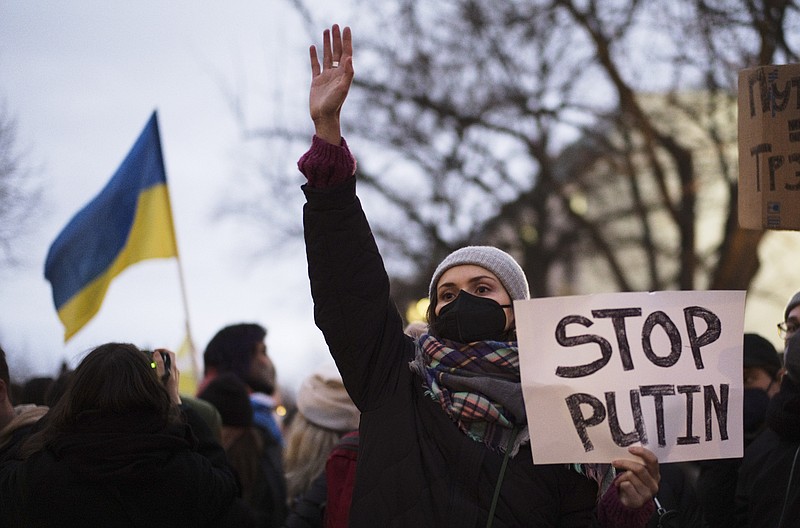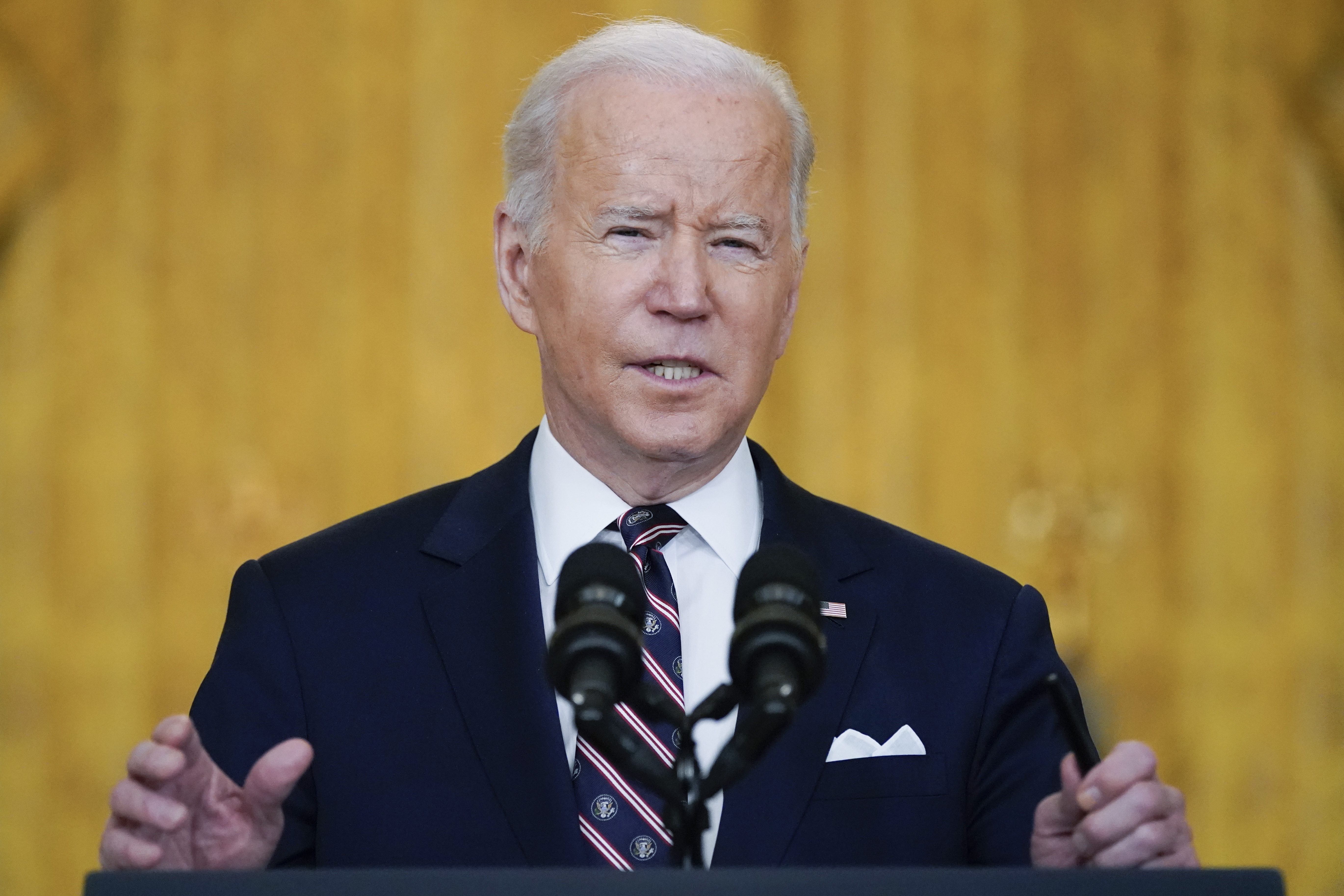MOSCOW -- Russian lawmakers Tuesday authorized President Vladimir Putin to use military force outside his country, and U.S. President Joe Biden and European leaders responded by slapping sanctions on Russian oligarchs and banks.
Both leaders signaled that an even bigger confrontation could lie ahead. Putin has yet to unleash the 150,000 troops massed on three sides of Ukraine, and Biden held back on the toughest sanctions that could cause economic turmoil for Russia but said they would go ahead if there is further aggression.
The measures, accompanied by the repositioning of additional U.S. troops to the Baltic nations on NATO's eastern flank bordering Russia, came as Russian forces rolled into rebel-held areas in eastern Ukraine after Putin said he was recognizing the independence of the separatist region in defiance of U.S. and European demands.
Speaking at the White House, Biden said the Kremlin had flagrantly violated international law in what he called the "beginning of a Russian invasion of Ukraine." He warned of more sanctions if Putin goes further.
"We are united in our support of Ukraine," Biden said. "We are united in our opposition to Russian aggression."
When it comes to Russian claims of a justification or pretext for an invasion, Biden said, "None of us should be fooled. None of us will be fooled. There is no justification."
Hopes for a diplomatic resolution to the threat of invasion, which U.S. officials have for weeks portrayed as all but inevitable, appeared to evaporate.
U.S. Secretary of State Antony Blinken said he canceled plans to meet his Russian counterpart in Geneva later this week as Russia presses ahead with recognition of separatist regions of Ukraine.
Blinken told reporters Tuesday that Russia's actions indicated Moscow was not serious about a diplomatic path to resolving the crisis. As a result, he said he had called off his Thursday meeting with Foreign Minister Sergey Lavrov.
French Foreign Minister Jean-Yves Le Drian also announced Tuesday the cancellation of a meeting with Lavrov, as French efforts to find a diplomatic solution to the conflict faltered.
Echoing Biden, Blinken said Putin's decision to recognize the independence of Ukraine's Donbas region is a violation of international law. He said the placement of Russian troops there constitutes the beginning of an invasion.
Blinken said on Twitter that "Russia's move to recognize the 'independence' of so-called republics controlled by its own proxies is a predictable, shameful act." He added that he had told Ukraine's foreign minister, Dmytro Kuleba, that the United States condemned the actions in the "strongest possible terms."
Although he held out hope for a peaceful resolution through diplomacy, he said he did not believe a meeting with Lavrov would be productive at this time.
Western nations sought to present a united front, with more than two dozen European Union members unanimously agreeing to levy their own initial set of sanctions against Russian officials.
Also, Germany said it was halting the process of certifying the Nord Stream 2 gas pipeline from Russia -- a lucrative deal long sought by Moscow but criticized by the U.S. for increasing Europe's reliance on Russian energy.
The U.S., meanwhile, moved to cut off Russia's government from Western finance, sanctioning two of its banks and blocking it from trading in its debt on American and European markets.
The administration's actions hit civilian leaders in Russia's leadership hierarchy and two Russian banks considered especially close to the Kremlin and Russia's military, with more than $80 billion in assets. That includes freezing all of those bank's assets under U.S. jurisdictions.
Biden, though, did hold back some of the broadest and toughest of the financial penalties contemplated by the U.S., including sanctions that would reinforce the hold that Germany put on any startup of the Nord Stream 2 pipeline; an export ban that would deny Russia U.S. high-tech for its industries and military; and bans that could cripple Russia's ability to do business with the rest of the world.
Biden said he was moving additional U.S. troops to the Baltics, though he described the actions as purely "defensive," asserting, "We have no intention of fighting Russia."
"We want to send an unmistakable message, though, that the United States, together with our allies, will defend every inch of NATO territory and abide by the commitments we made to NATO," Biden said.
U.S. TROOPS
The U.S. is sending about 800 infantry troops and 40 attack aircraft to the Baltics and NATO's eastern flank from other locations within Europe, according to a senior defense official. In addition, a contingent of F-35 strike fighters and AH-64 Apache attack helicopters will be relocated.
Earlier Tuesday, members of Russia's upper house, the Federation Council, voted unanimously to allow Putin to use military force outside the country -- effectively formalizing a Russian military deployment to the rebel regions, where an 8-year conflict has killed nearly 14,000 people.
Council Speaker Valentina Matviyenko said this would allow Russia to deploy military forces in the separatist regions of eastern Ukraine, calling them "peacekeeping forces." The United States and allies said that had already happened.
Shortly afterward, Putin laid out three conditions to end the crisis that has threatened to plunge Europe back into war, raising the specter of casualties, energy shortages across the continent and global economic chaos.
Putin said the crisis could be resolved if Kyiv recognizes Russia's sovereignty over Crimea, the Black Sea peninsula that Moscow annexed from Ukraine in 2014, renounces its bid to join NATO and partially demilitarizes. The West has decried the annexation of Crimea as a violation of international law and has previously flatly rejected permanently barring Ukraine from NATO.
Asked if he has sent any Russian troops into Ukraine and how far they could go, Putin responded: "I haven't said that the troops will go there right now." He added that "it's impossible to forecast a specific pattern of action -- it will depend on a concrete situation as it takes shape on the ground."
The European Union announced initial sanctions aimed at the 351 Russian lawmakers who voted for recognizing separatist regions in Ukraine, as well as 27 other Russian officials and institutions from the defense and banking sectors. They also sought to limit Moscow's access to EU capital and financial markets.
The White House began referring to the Russian deployments in the region known as the Donbas as an "invasion" after initially hesitating to use the term -- a red line that Biden had said would result in severe sanctions.
"We think this is, yes, the beginning of an invasion, Russia's latest invasion into Ukraine," Jon Finer, principal deputy national security adviser, said on CNN. "An invasion is an invasion. And that is what is underway."
LIMITED SANCTIONS
The White House announced limited sanctions targeting the rebel-region Monday evening soon after Putin said he was sending troops to eastern Ukraine. A senior Biden administration official, who briefed reporters about the sanctions targeting the breakaway region noted "that Russia has occupied these regions since 2014" and that "Russian troops moving into Donbas would not itself be a new step."
Western leaders have long warned that Moscow would look for cover to invade -- and just such pretext appeared to come Monday, when Putin recognized as independent two separatist regions in eastern Ukraine, where government troops have fought Russia-backed rebels. The Kremlin then raised the stakes further by saying that recognition extends even to the large parts now held by Ukrainian forces.
Putin said Russia has recognized the rebel regions' independence in the borders that existed when they made their declaration in 2014 -- broad territories that extend far beyond the areas now under separatist control and that include the major Azov Sea port of Mariupol. He added, however, that the rebels should eventually negotiate with Ukraine.
Putin dismissed what he described as speculation that Moscow planned to "re-create the Russian Empire in the empire's boundaries."
Condemnation from around the world was quick. In Washington, lawmakers from both parties in Congress backed an independent Ukraine and vowed continued U.S. support, even as some pushed for swifter and even more severe sanctions on Russia. Senators had been considering a sanctions package against Putin's regime but held off as the White House pursued its strategy.
Ukrainian President Volodymyr Zelenskyy said he would consider breaking diplomatic ties with Russia, and Kyiv recalled its ambassador in Moscow.
Russia's recent moves have created the most dangerous moment for European security in a generation, NATO Secretary General Jens Stoltenberg warned Tuesday, and the alliance sees every indication that Moscow is still planning for a "full-scale" attack.
"Moscow has moved from covert attempts to destabilize Ukraine to overt military action," he told reporters in Brussels after an emergency meeting of the Ukraine-NATO Commission.
Stoltenberg said Russia has 150,000 troops massed around Ukraine and noted that they are increasingly in combat formations.
"They are out of their camps, in the field and ready to strike," he said.
Despite these warnings, Stoltenberg did not announce significant new moves. He said NATO has bolstered its presence in the eastern part of the alliance and could do even more "if necessary."
British Prime Minister Boris Johnson said the U.K. would slap sanctions on five Russian banks and three wealthy individuals. He warned a full-scale offensive would bring "further powerful sanctions."
Zelenskyy said he was calling up some of the country's military reservists but added that there was no need for a full military mobilization.
In an address to the nation, Zelenskyy said his decree applied only to those assigned to the so-called operational reserve, which is typically activated during ongoing hostilities, and covers "a special period of time," without clarifying what that means.
"Today there is no need for a full mobilization. We need to quickly add additional staff to the Ukrainian army and other military formations," he said.
National Security and Defense Council Oleksiy Reznikov said earlier this year that Ukraine can call up to 2.5 million people.
"Ahead will be a difficult trial," Reznikov said in a somber message released by the military. "There will be losses. You will have to go through pain and overcome fear and despondency."
Information for this article was contributed by Vladimir Isachenkov, Yuras Karmanau, Aamer Madhani, Eric Tucker, Jill Lawless, Lorne Cook, Barry Hatton, Dasha Litvinova, Geir Moulson, Frank Jordans, Edith M. Lederer, Ellen Knickmeyer, Robert Burns, Matthew Lee, Zeke Miller, Chris Megerian, Darlene Superville of The Associated Press; by Robyn Dixon, Rachel Pannett, Ellen Francis, John Wagner, Mariana Alfaro, Rick Noack, Emily Rauhala and Amy B. Wang of The Washington Post; and by Anton Troianovski, Valerie Hopkins, Andrew E. Kramer, Michael Schwirtz and Shashank Bengali of The New York Times.
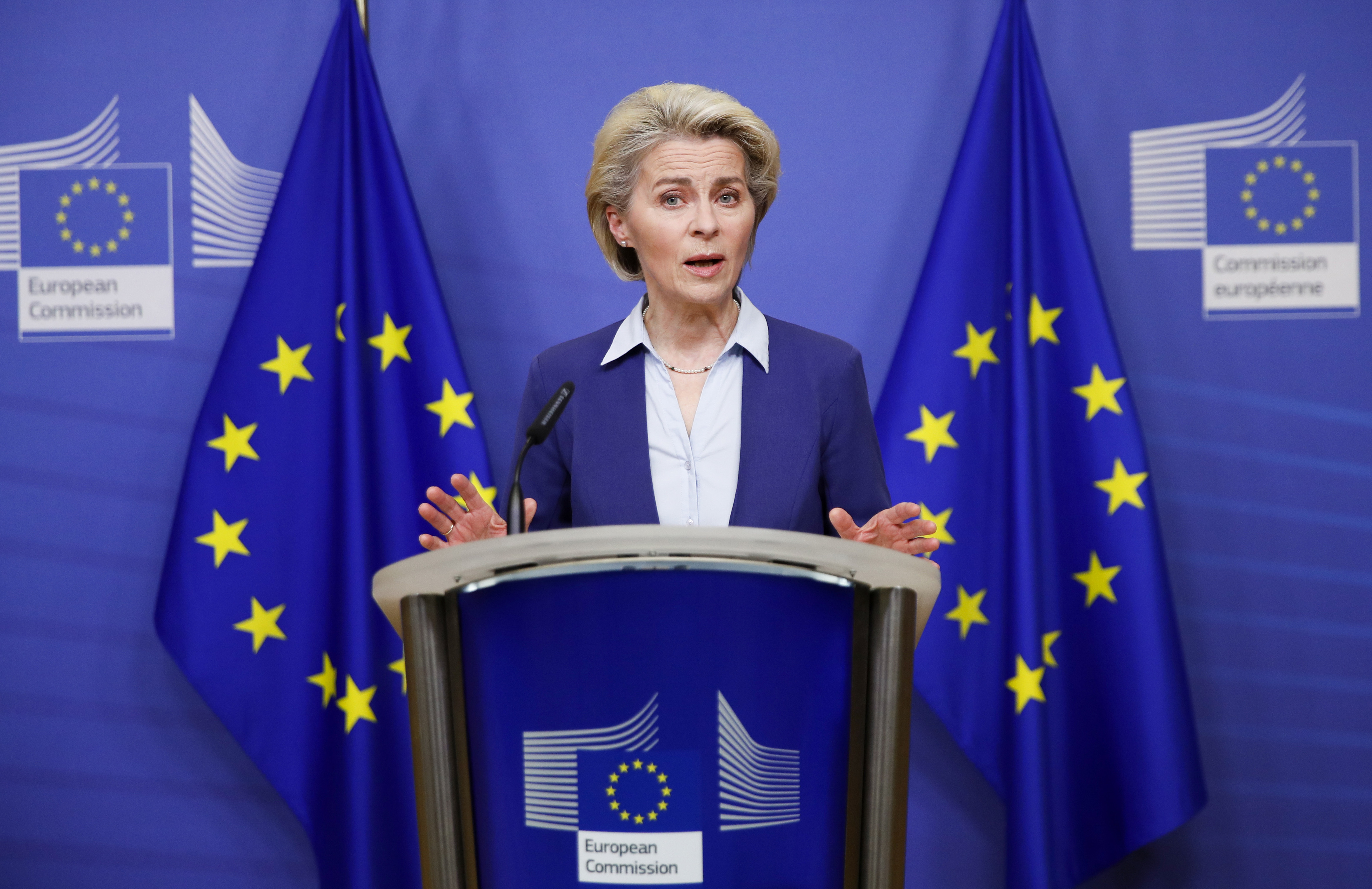 European Commission President Ursula von der Leyen delivers a statement on Ukraine at EU headquarters in Brussels, Tuesday, Feb. 22, 2022. World leaders are getting over the shock of Russian President Vladimir Putin ordering his forces into separatist regions of Ukraine and they are focusing on producing as forceful a reaction as possible. Germany made the first big move Tuesday and took steps to halt the process of certifying the Nord Stream 2 gas pipeline from Russia. (Johanna Geron, Pool Photo via AP)
European Commission President Ursula von der Leyen delivers a statement on Ukraine at EU headquarters in Brussels, Tuesday, Feb. 22, 2022. World leaders are getting over the shock of Russian President Vladimir Putin ordering his forces into separatist regions of Ukraine and they are focusing on producing as forceful a reaction as possible. Germany made the first big move Tuesday and took steps to halt the process of certifying the Nord Stream 2 gas pipeline from Russia. (Johanna Geron, Pool Photo via AP)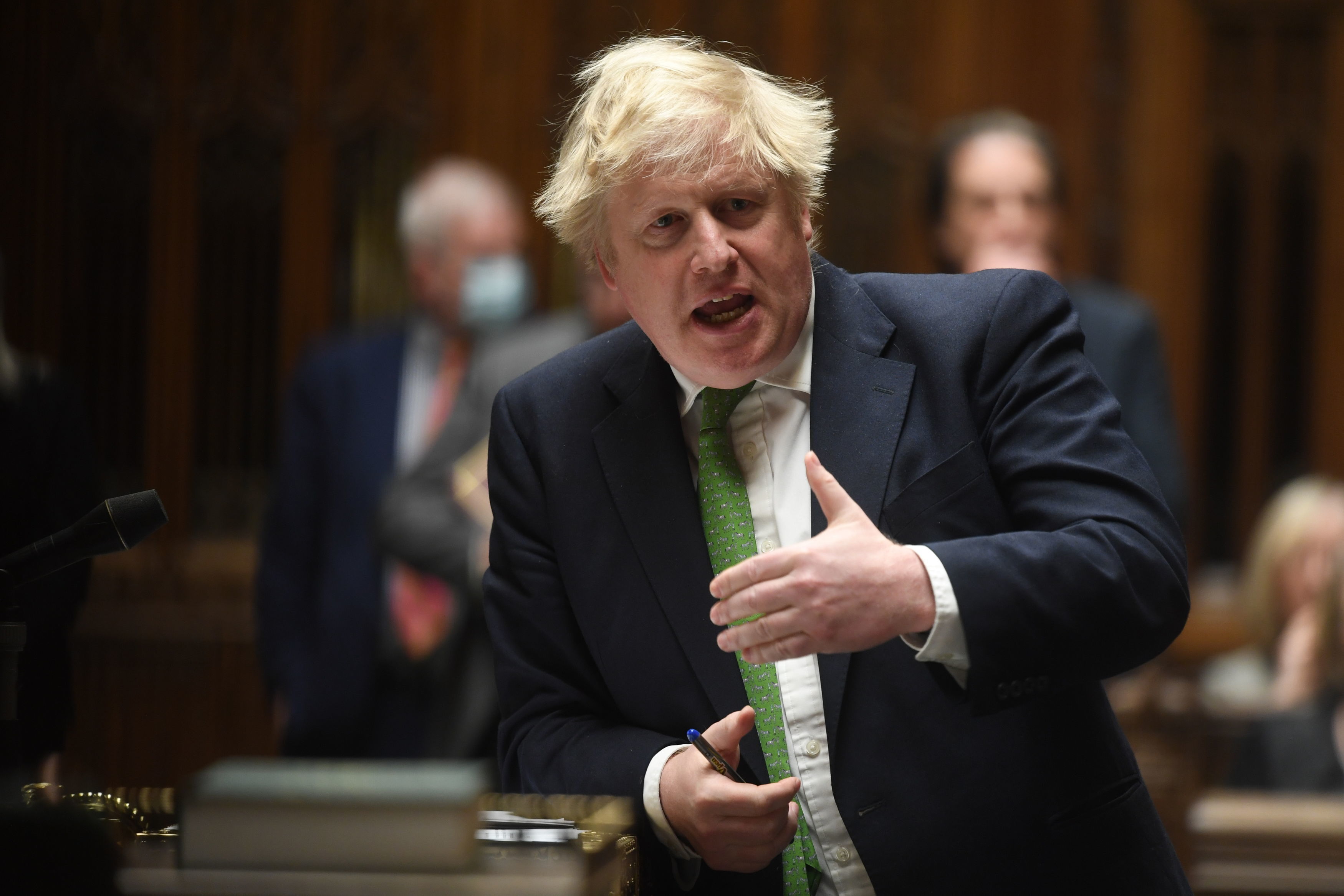 In this handout photo provided by UK Parliament, Britain's Prime Minister Boris Johnson updates MPs on the latest situation in Ukraine, in the House of Commons in London, Tuesday, Feb. 22, 2022. Johnson says Britain is slapping sanctions on five Russian banks and three wealthy individuals over Russia’s latest military moves on Ukraine. He told lawmakers that sanctions would hit Rossiya Bank, IS Bank, General Bank, Promsvyazbank and the Black Sea Bank. (Jessica Taylor/UK Parliament via AP)
In this handout photo provided by UK Parliament, Britain's Prime Minister Boris Johnson updates MPs on the latest situation in Ukraine, in the House of Commons in London, Tuesday, Feb. 22, 2022. Johnson says Britain is slapping sanctions on five Russian banks and three wealthy individuals over Russia’s latest military moves on Ukraine. He told lawmakers that sanctions would hit Rossiya Bank, IS Bank, General Bank, Promsvyazbank and the Black Sea Bank. (Jessica Taylor/UK Parliament via AP)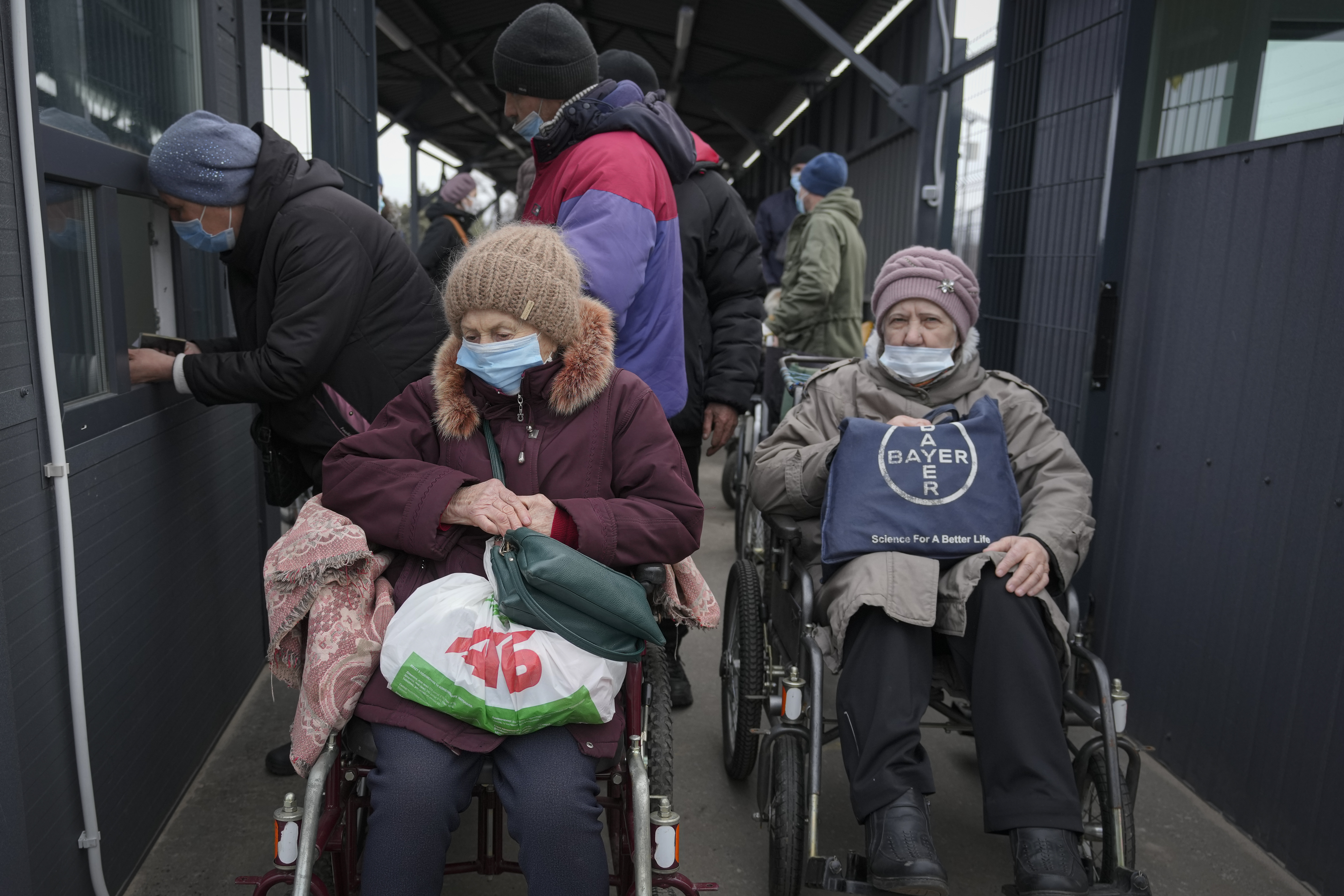 People wait to cross from Ukrainian government controlled areas to pro-Russian separatists controlled territory in Stanytsia Luhanska, the only crossing point open daily, in the Luhansk region, eastern Ukraine, Tuesday, Feb. 22, 2022. Russian lawmakers on Tuesday authorized President Vladimir Putin to use military force outside the country — a move that could presage a broader attack on Ukraine after the U.S. said an invasion was already underway there. (AP Photo/Vadim Ghirda)
People wait to cross from Ukrainian government controlled areas to pro-Russian separatists controlled territory in Stanytsia Luhanska, the only crossing point open daily, in the Luhansk region, eastern Ukraine, Tuesday, Feb. 22, 2022. Russian lawmakers on Tuesday authorized President Vladimir Putin to use military force outside the country — a move that could presage a broader attack on Ukraine after the U.S. said an invasion was already underway there. (AP Photo/Vadim Ghirda)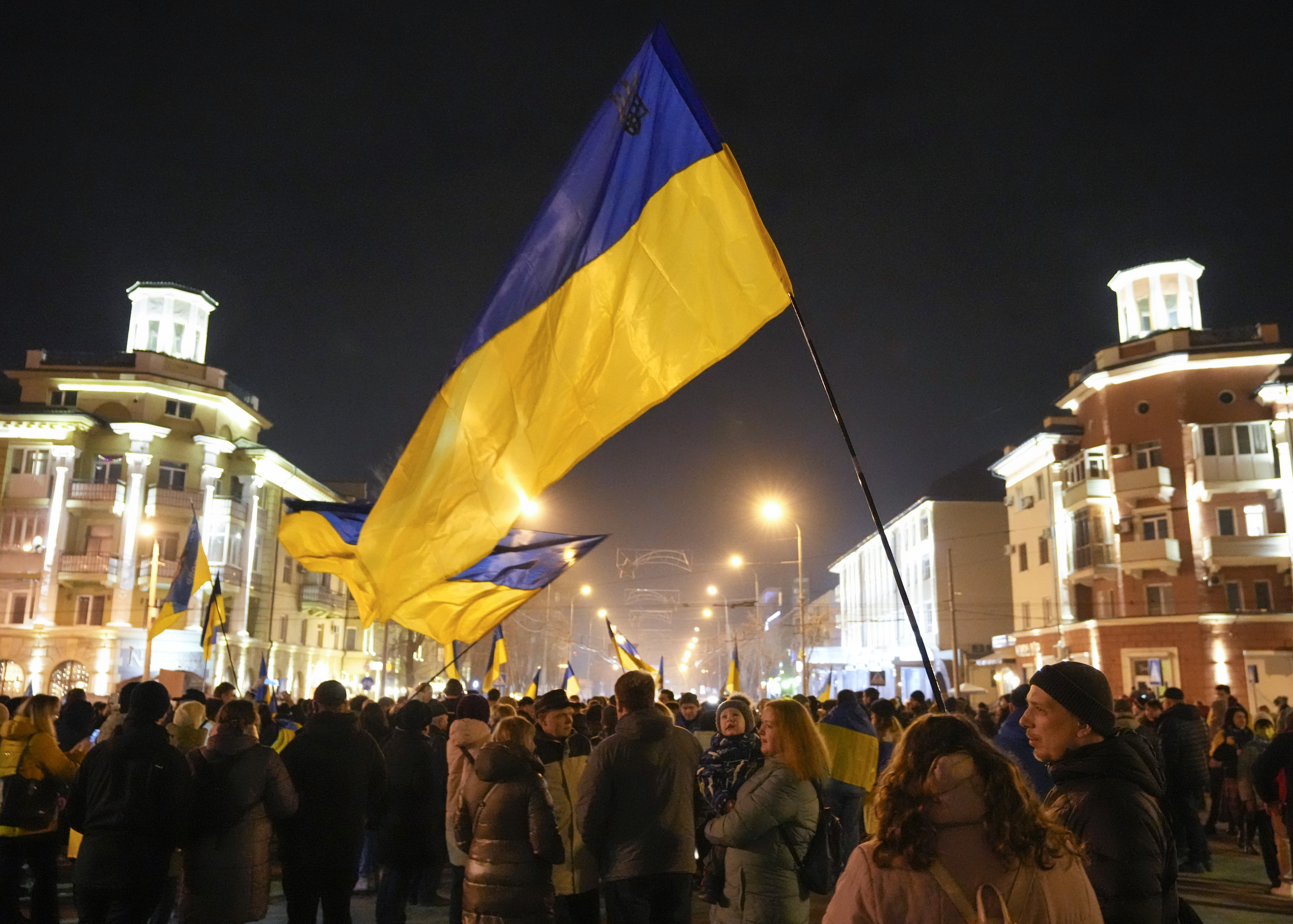 Ukrainians gather for "Mariupol is Ukraine" in Mariupol, Ukraine, Tuesday, Feb. 22, 2022. Russian lawmakers on Tuesday authorized President Vladimir Putin to use military force outside the country — a move that could presage a broader attack on Ukraine after the U.S. said an invasion was already underway there. (AP Photo/Sergei Grits)
Ukrainians gather for "Mariupol is Ukraine" in Mariupol, Ukraine, Tuesday, Feb. 22, 2022. Russian lawmakers on Tuesday authorized President Vladimir Putin to use military force outside the country — a move that could presage a broader attack on Ukraine after the U.S. said an invasion was already underway there. (AP Photo/Sergei Grits)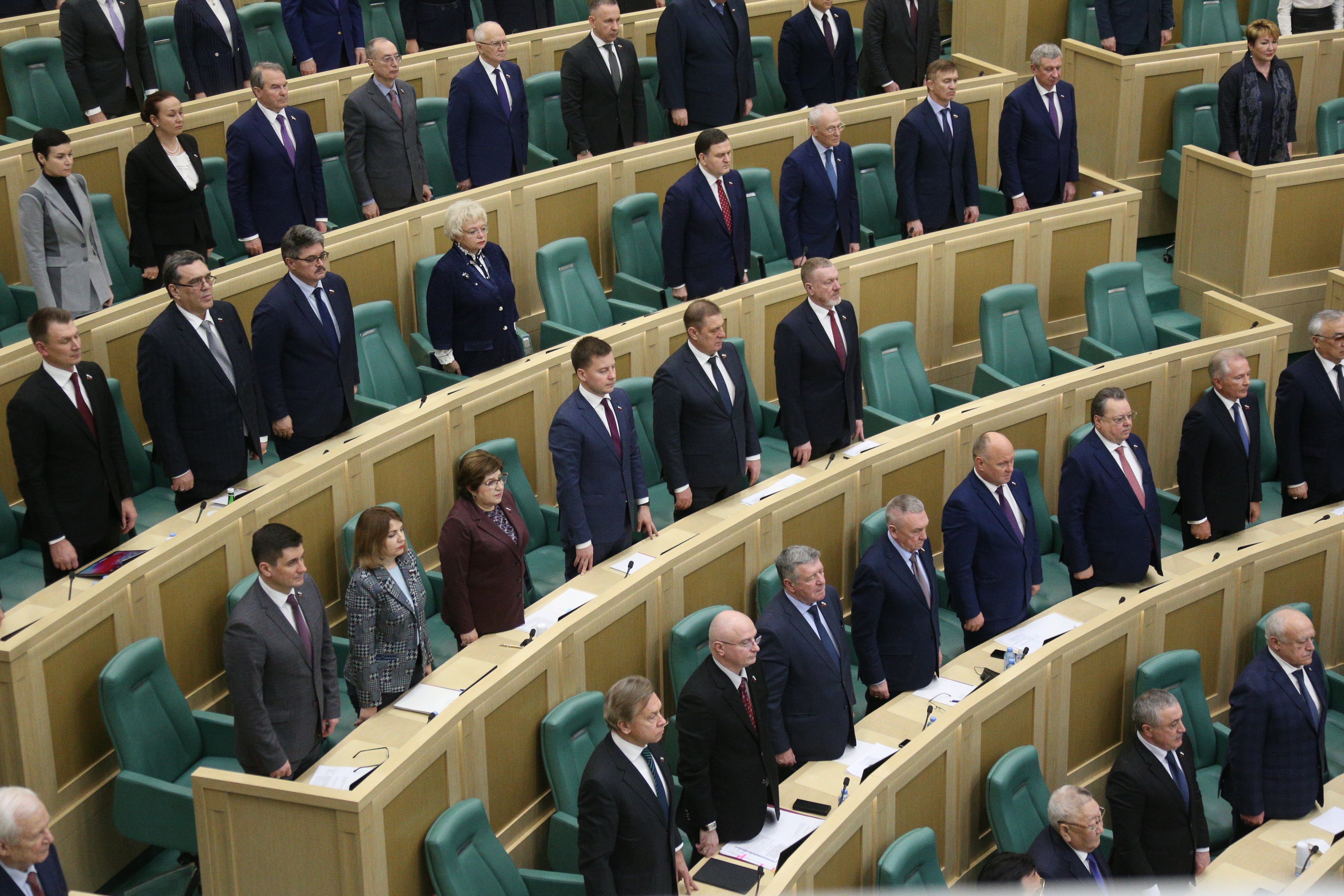 In this photo provided by the Federation Council of the Federal Assembly of the Russian Federation, lawmakers of Federation Council of the Federal Assembly of the Russian Federation listen to the national anthem as they attend a session in Moscow, Russia, Tuesday, Feb. 22, 2022. Lawmakers gave Russian President Vladimir Putin permission to use military force outside the country on Tuesday. Several European leaders said earlier in the day that Russian troops have moved into rebel-held areas in eastern Ukraine after Putin recognized their independence. (Federation Council of the Federal Assembly of the Russian Federation via AP)
In this photo provided by the Federation Council of the Federal Assembly of the Russian Federation, lawmakers of Federation Council of the Federal Assembly of the Russian Federation listen to the national anthem as they attend a session in Moscow, Russia, Tuesday, Feb. 22, 2022. Lawmakers gave Russian President Vladimir Putin permission to use military force outside the country on Tuesday. Several European leaders said earlier in the day that Russian troops have moved into rebel-held areas in eastern Ukraine after Putin recognized their independence. (Federation Council of the Federal Assembly of the Russian Federation via AP)